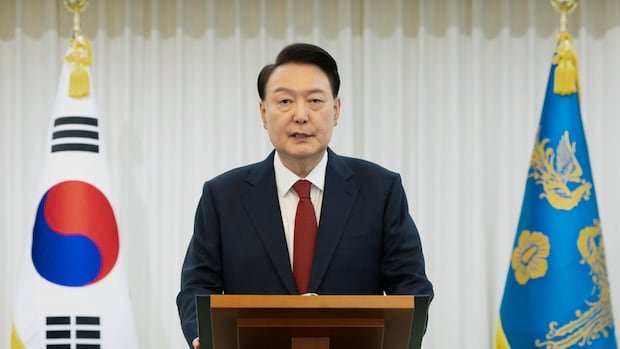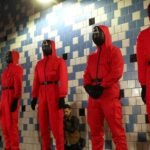South Korean law enforcement authorities are pushing to summon accused President Yoon Suk Yeol for questioning over his short-lived martial law decree, as the Constitutional Court began its first session on Yoon’s case on Monday to decide whether he should be removed from office or reinstated.
A joint investigative team made up of police, an anti-corruption agency and the defense ministry plans to ask Yoon’s office to appear for questioning on Wednesday as it widens the probe into whether his ill-planned power grab amounted to a rebellion.
Yoon was impeached by the opposition-controlled National Assembly on Saturday over his Dec. 3 martial law decree. His powers as president are suspended until the Constitutional Court decides whether to formally remove him from office or reinstate him. If Yoon is fired, an election to choose his successor must be held within 60 days.
Yoon has justified his enforcement of martial law as a necessary act of governance against an opposition he described as “anti-state forces” that were blocking his plans, and vowed to fight efforts to remove him from office “to the end.” battle”.
Hundreds of thousands of demonstrators have flocked to the streets of the country’s capital Seoul in recent days, calling for Yoon’s ouster and arrest.
South Korea’s parliament voted Saturday to impeach President Yoon Suk Yeol over his short-lived martial law decree, a historic rebuke that was cheered by cheering crowds who called the result another defiant moment in the country’s resilient democratic journey.
It remains unclear whether Yoon will grant investigators’ request for an interview. South Korean prosecutors, who are pursuing a separate investigation into the incident, also reportedly asked Yoon to appear for questioning at the prosecutor’s office on Sunday, but he refused to do so. Repeated calls to a prosecutor’s office in Seoul went unanswered.
Yoon’s office has also resisted an attempt by police to search the site for evidence.
The request was made before the Constitutional Court meets later on Monday to consider the case. The court has up to 180 days to rule, but observers say a court ruling could come sooner.
In the case of the parliamentary impeachment of former presidents – Roh Moo-hyun in 2004 and Park Geun-hye in 2016 – the court spent 63 and 91 days, respectively, before deciding to reinstate Roh and fire Park.
In the last 24 hours, South Korean President Yoon Suk Yeol declared martial law, but his decision was unanimously rejected in a parliamentary vote. Andrew Chang explains the turmoil that led to the president’s statement and what it says about the state of South Korean politics. Images provided by Reuters and Getty Images.
Prime Minister Han Duck-soo, who will serve as the country’s acting leader while Yoon’s powers are suspended, and other government officials have sought to reassure allies and markets after Yoon’s surprise maneuver paralyzed politics, halted high-level diplomacy and curbed efforts to Revival made difficult by weakening economy.
Liberal opposition leader Lee Jae-myung, whose Democratic Party has a majority in the National Assembly, called on the Constitutional Court to quickly decide on Yoon’s removal from office and proposed a special council for political cooperation between the government and parliament.
Lee, a passionate lawmaker who has waged a political offensive against Yoon’s government for years, is considered a leading candidate to succeed him. He lost the 2022 presidential election by a narrow margin to Yoon.

Kweon Seong-dong, leader of Yoon’s conservative People Power Party, separately criticized Lee’s proposal, saying it was “not right” for the opposition party to act like the ruling party.
Yoon’s impeachment, advocated in parliament by some of his ruling People Power Party lawmakers, has created a deep divide within the party between Yoon’s loyalists and his opponents. On Monday, PPP Chairman Han Dong-hun, a strong critic of Yoon’s martial law, announced his resignation.
“If martial law had not been lifted that night, there could have been a bloody incident this morning between the citizens who took to the streets and our young soldiers,” Han said at a news conference.
Yoon’s declaration of martial law on December 3, the first of its kind in more than four decades, recalled an era of authoritarian leaders that the country had not seen since the 1980s. Yoon had to rescind his decree hours later after parliament voted unanimously to repeal it.
Yoon sent hundreds of soldiers and police to parliament to prevent the vote, but they withdrew after parliament rejected Yoon’s decree. There was no major violence.
Opposition parties accused Yoon of rebellion, saying a president in South Korea can only declare martial law in times of war or similar emergencies and even in those cases has no right to suspend the work of parliament.






